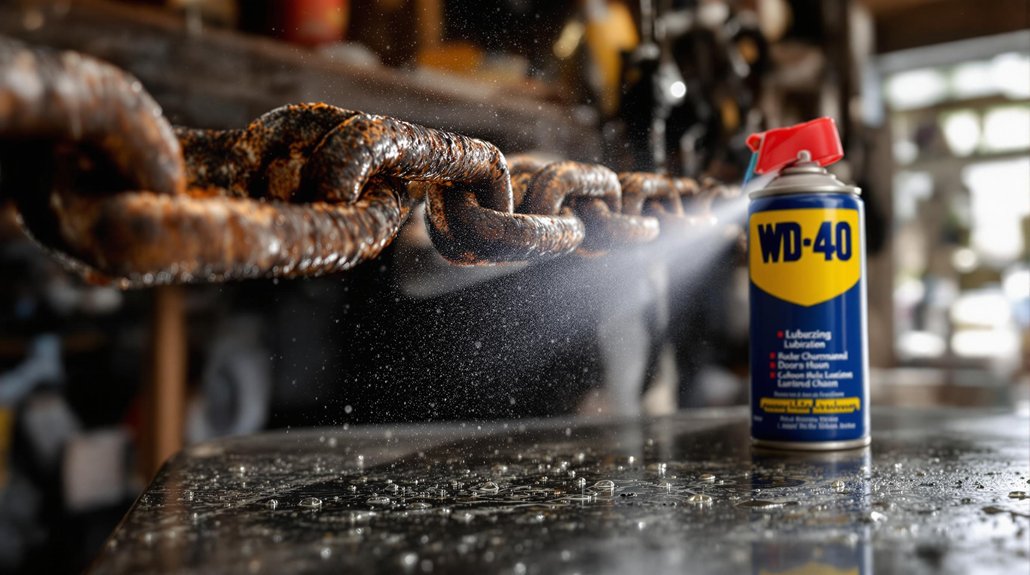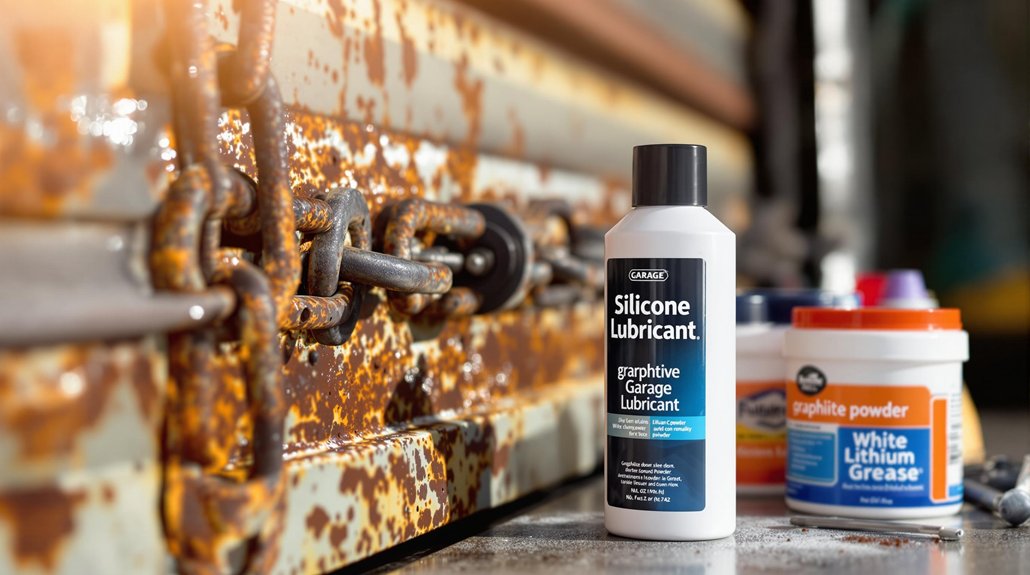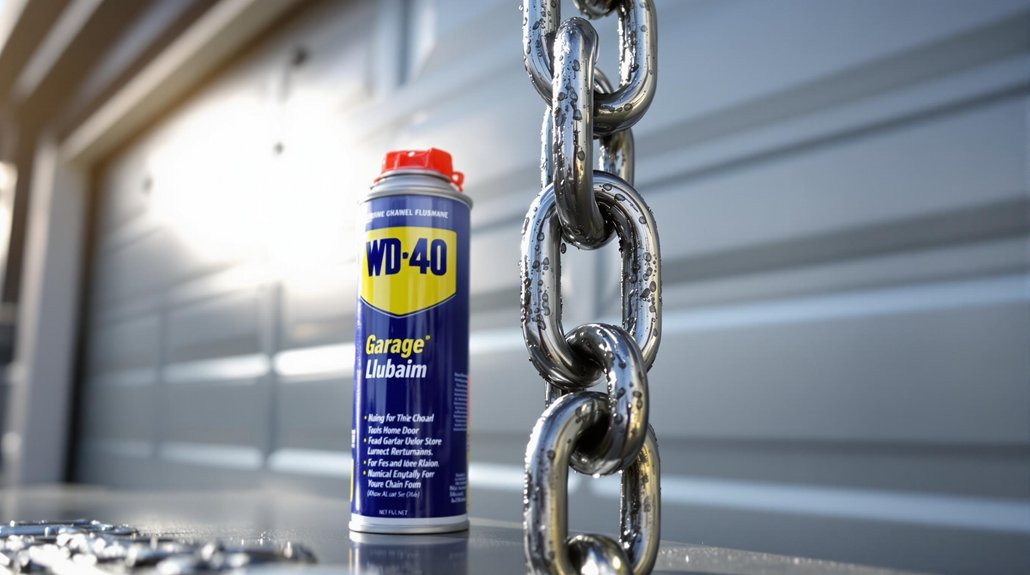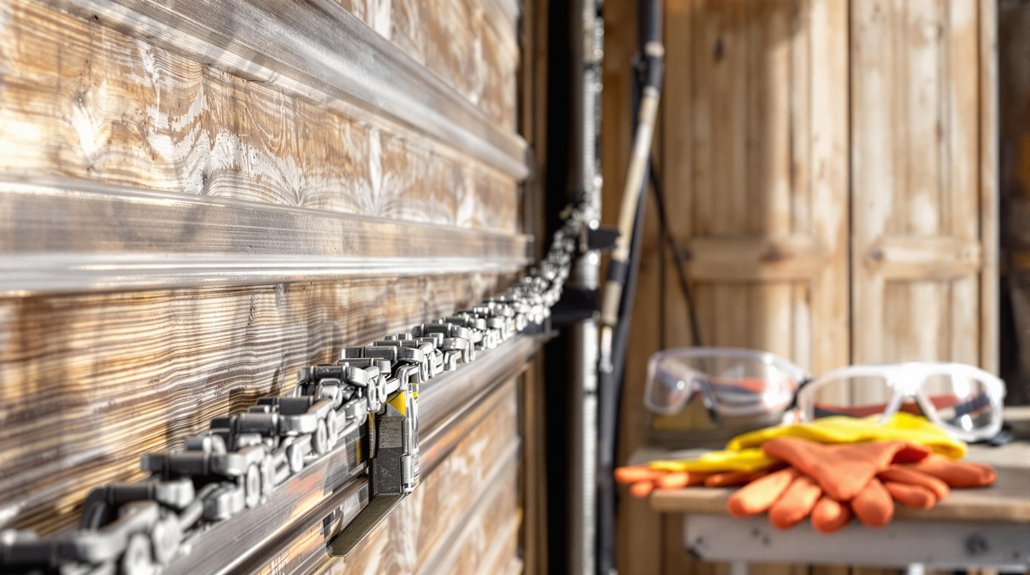Yes, you can use WD-40 on your garage door chain, but it is not the best long-term option. WD-40 serves as a temporary lubricant and helps repel moisture, which can be beneficial in certain conditions. However, it tends to attract dirt and grime, leading to buildup that can interfere with the chain's movement. For lasting results, consider using specialized lubricants designed for garage door chains. Regular maintenance and proper application techniques are essential for peak performance. For additional insights on alternatives and maintenance tips, there are useful details available.
Key Article Highlights
- WD-40 can be used on garage door chains for temporary lubrication and moisture displacement but is not a true lubricant.
- Frequent use of WD-40 may attract dirt and grime, leading to buildup on the chain.
- It's essential to clean the chain thoroughly before applying WD-40 for better adhesion and effectiveness.
- Over time, relying solely on WD-40 can result in sticky residue, compromising the chain's performance.
- Consider alternative lubricants like lithium grease or silicone spray for long-term maintenance of your garage door chain.
Understanding WD-40 Composition
WD-40 is a well-known multi-purpose product commonly found in many households and workshops. It is often used for various tasks, including lubrication, rust prevention, and cleaning. A deeper understanding of its composition can enhance its application and effectiveness.
The WD 40 ingredients analysis reveals that this product primarily consists of a combination of hydrocarbons, including mineral oil, aliphatic hydrocarbons, and petroleum distillates. These ingredients work together to provide a protective layer that prevents moisture and rust. Additionally, the product contains a small amount of surfactants, which help to break down grease and grime.
In terms of its chemical properties overview, WD-40 exhibits characteristics such as low viscosity and a high degree of penetration. This allows it to seep into tight spaces and effectively lubricate moving parts. It is also non-conductive, making it safe to use on electrical components. Understanding these properties is key for users aiming to master the application of WD-40 in various scenarios, including maintaining garage door chains. This knowledge can lead to better performance and longer-lasting results when using this versatile product.
Pros of Using WD-40
Utilizing WD-40 for garage door chain maintenance offers several advantages. First, WD-40 is known for its effective lubrication benefits. It reduces friction between the moving parts of the chain. This can lead to smoother operation and less wear over time. A well-lubricated chain can also help prevent rust and corrosion, which are common problems in garage door systems.
Another advantage of using WD-40 is its ease of application. The spray can reach tight spaces, making it simple to apply to the chain without disassembling any parts. This saves time and effort during maintenance tasks. Additionally, WD-40 can help displace moisture, which is useful in damp environments. By keeping the chain dry, it extends its lifespan and improves functionality.
Finally, WD-40 is widely available and cost-effective. It can be found in most hardware stores, making it an accessible choice for homeowners. Overall, incorporating WD-40 into your garage door chain maintenance routine can enhance performance and longevity. By taking advantage of its lubrication benefits and ease of use, you can guarantee your garage door operates smoothly and reliably for years to come.
Cons of Using WD-40

While WD-40 has its advantages, there are notable drawbacks to using it on garage door chains. One significant concern is that WD-40 is not a true lubricant. It is primarily a solvent, which means it can clean and displace moisture but may not provide long-lasting lubrication. This can lead to increased friction in the chain over time, potentially causing chain damage.
Another issue with WD-40 is its tendency to attract dirt and grime. Since it does not form a protective barrier, debris can easily accumulate on the chain. This buildup can cause additional wear and tear, further compromising the chain's performance.
Additionally, frequent application of WD-40 may lead to a sticky residue. This residue can interfere with the chain's movement and may require more frequent cleaning.
Lastly, using WD-40 on a garage door chain may void warranties or compromise manufacturer recommendations. It is essential to take into account these WD-40 drawbacks before choosing it as a maintenance solution for your garage door chain. Overall, while WD-40 can provide temporary relief, it is not always the best choice for long-term maintenance.
Proper Application Techniques
Proper application techniques are essential for effective lubrication of your garage door chain. It is important to know how often to apply WD-40 and the correct steps to guarantee even coverage. This will help maintain the functionality and longevity of your garage door system.
Lubrication Frequency Recommendations
How often should you lubricate your garage door chain to guarantee smooth operation? Regular maintenance is essential for ensuring the longevity and efficiency of your garage door system. Proper lubrication intervals will help prevent wear and tear on the chain, reducing the risk of malfunction.
Consider the following recommendations for chain maintenance:
- Every 6 months: A bi-annual inspection and lubrication will keep the chain functioning effectively. This is especially important if you live in an area with extreme weather conditions.
- After heavy use: If your garage door is used frequently, it may require more frequent lubrication. Pay attention to any signs of noise or resistance during operation.
- Seasonal checks: Before the onset of winter and summer, it's wise to check and lubricate the chain. Temperature fluctuations can affect the lubricant's effectiveness.
Application Method Steps
It is important to apply lubricant correctly to guarantee the garage door chain operates smoothly. Following proper application techniques guarantees effective lubrication and longevity of the chain.
First, gather the necessary tools: WD-40, a clean cloth, and a small brush. Begin by cleaning the garage door chain with the cloth to remove dirt and debris. This step is vital, as it allows the lubricant to adhere properly.
Next, shake the WD-40 canister well. Position the nozzle near the chain and spray a light coat along the entire length. It is essential not to oversaturate, as excess lubricant can attract more dirt.
After applying, use the small brush to spread the lubricant evenly. This will help penetrate any tight spots and guarantee smooth operation.
Finally, manually operate the garage door several times to distribute the lubricant fully. This action allows the lubrication methods to take effect, improving performance.
Regularly check the chain for wear and tear, and repeat these application techniques as needed. Proper lubrication will enhance the efficiency and lifespan of your garage door system.
Alternatives to WD-40

When evaluating alternatives to WD-40 for lubricating a garage door chain, several effective options are available. It is vital to choose the right lubricant to guarantee proper chain maintenance and long-lasting performance. Here are three lubricant alternatives to take into account:
- Lithium Grease: This thick lubricant provides excellent protection against moisture and wear. It adheres well to surfaces, making it ideal for heavy-duty applications like garage door chains.
- Silicone Spray: Silicone spray is a lightweight option that repels water and reduces friction. It can easily reach hard-to-access areas and leaves a clean finish without attracting dirt.
- Graphite Powder: This dry lubricant is excellent for chains. It reduces friction without creating a messy residue. Graphite powder works well in environments where moisture is a concern.
Choosing the right lubricant alternatives is vital for effective chain maintenance. Each option has unique benefits, making them suitable for different needs. Always guarantee that you apply the chosen lubricant properly for peak performance and longevity of your garage door chain.
Recommended Lubricants for Chains
Numerous recommended lubricants can effectively maintain the performance of garage door chains. Proper chain maintenance is essential for smooth operation and longevity. There are various lubrication types that can be used, each with specific benefits.
One popular option is lithium grease. This thick lubricant adheres well to the chain, providing long-lasting protection against wear and rust. Another effective choice is silicone spray. It offers excellent moisture resistance and does not attract dirt, making it ideal for outdoor use.
For those seeking a lighter option, penetrating oil can be effective. It seeps into tight spaces and helps remove debris while providing a degree of lubrication. However, it may require more frequent application.
Chain oil is specifically designed for this purpose. It provides a good balance of adhesion and fluidity, guaranteeing proper coverage on the chain.
When selecting a lubricant, consider the environment and the specific needs of your garage door system. Regular application of the right lubricant will enhance performance and extend the life of your garage door chain. Proper understanding of lubrication types will guarantee effective chain maintenance.
Maintenance Tips for Garage Doors

Regular maintenance is key to guaranteeing the longevity and functionality of garage doors. Proper care not only enhances performance but also reduces the risk of costly repairs. Here are three essential maintenance tips for garage doors:
- Inspect the Chain: Regularly check the garage door chain for signs of wear. Look for rust, fraying, or any obstructions that may hinder movement. Keeping the chain in good condition is crucial for smooth operation.
- Clean and Lubricate: Clean the chain and surrounding areas to remove dirt and debris. Use a suitable lubricant specifically designed for garage door chain maintenance. This step reduces friction and guarantees seamless operation.
- Check Hardware: Inspect all the hardware, including springs, rollers, and hinges. Tighten any loose bolts and replace worn parts as needed. This guarantees the entire system works together effectively.
Signs Your Chain Needs Lubrication
Identifying when your garage door chain needs lubrication is vital for maintaining its performance. One of the first signs to watch for is chain noise. If you hear unusual sounds, such as grinding or squeaking, it often indicates that the chain is dry and requires lubrication. Regular operation should be smooth and quiet; any deviation signals that attention is needed.
Another important indicator is chain rust. If you notice any signs of rust on the chain, it is a clear sign that moisture is affecting its integrity. Rust can cause friction and wear, leading to potential failure if not addressed promptly. Inspect the chain periodically for any discoloration or flaking, as these are signs that lubrication is necessary.
Additionally, if the garage door moves slowly or hesitates during operation, this may also suggest that the chain is not adequately lubricated. Proper lubrication guarantees that the chain functions efficiently, prolonging its lifespan and enhancing the overall performance of your garage door system. Regular checks and maintenance can help you identify these signs early, guaranteeing smooth operation and minimizing the risk of damage.
Safety Precautions to Consider

When using WD-40 on a garage door chain, it is important to take safety precautions. Always wear protective gear, such as gloves and goggles, to shield yourself from potential splashes. Additionally, be careful to avoid any electrical components to prevent accidents.
Wear Protective Gear
Guaranteeing your safety during any maintenance task is crucial, especially when working with garage door chains. Proper protective gear can help prevent injuries and guarantee a smooth process. Here are some important items to take into account:
- Safety Goggles: Protect your eyes from debris or oil splashes that may occur during the maintenance process. Safety goggles provide a clear view while offering necessary protection.
- Protective Gloves: Wearing protective gloves is essential. They prevent cuts and scrapes from sharp edges on the garage door chain. Additionally, gloves reduce the risk of slipping while handling tools or applying lubricant.
- Dust Mask: If you are working with WD-40 or similar products, a dust mask can help protect your lungs from inhaling fumes. This is especially important in enclosed spaces.
Avoid Electrical Components
It is important to stay clear of electrical components while working on your garage door chain. The garage door system often includes wiring and electrical parts. Contact with these components can cause damage or injury. Always prioritize electrical safety to guarantee a safe work environment.
Before starting any maintenance, turn off the power to your garage door opener. This will help protect both you and the electrical components. Use caution when handling the chain and surrounding areas. WD-40 can be useful for lubricating the chain, but avoid getting it on any electrical parts.
Here are some key points to take into account:
| Precaution | Description |
|---|---|
| Turn Off Power | Guarantee the opener is off. |
| Avoid Direct Contact | Keep tools away from wires. |
| Use Non-Conductive Tools | Opt for insulated tools. |
| Inspect for Damage | Check wires for wear. |
| Maintain Distance | Keep a safe space from plugs. |
When to Call a Professional
Several signs indicate that it may be time to call a professional for garage door maintenance. While some issues can be handled when to DIY, others require expert attention. Knowing when to hire is vital for safety and proper function.
Consider these three signs that suggest professional help is needed:
- Unusual Noises: If your garage door makes grinding, rattling, or squeaking sounds, it may signal a more serious issue.
- Stuck Door: A garage door that won't open or close properly could indicate a malfunctioning motor or misaligned tracks, requiring a professional assessment.
- Frequent Breakdowns: If your door frequently needs repairs, it may be time to consult an expert for a thorough inspection.
In these cases, hiring a trained technician guarantees that problems are correctly diagnosed and fixed. Attempting to address complex issues without expertise can lead to further damage or safety hazards. Always prioritize safety and functionality when considering garage door repairs. Knowing when to hire is essential for maintaining your garage door effectively.
Frequently Asked Questions
Can WD-40 Damage My Garage Door Chain Over Time?
Using WD-40 on a garage door chain may lead to chain wear over time. Its long-term effects can cause buildup, potentially impacting performance. Consider alternative lubricants specifically designed for chains to guarantee peak maintenance.
Is WD-40 Safe for Plastic or Rubber Parts?
Is WD-40 truly the best choice for all materials? While convenient, it may not be ideal for plastic compatibility. Consider WD-40 alternatives designed specifically for rubber and plastic to guarantee maximum protection and performance.
How Often Should I Lubricate My Garage Door Chain?
Lubrication frequency for your garage door chain should be every six months. Following these garage maintenance tips guarantees smooth operation and prevents wear. Regular checks help maintain functionality and extend the life of your garage door system.
Can I Use WD-40 on Other Moving Parts?
Like a well-oiled machine, proper moving part maintenance is essential. While WD-40 offers temporary lubrication, consider more effective alternatives, such as lithium grease or silicone sprays, for long-lasting protection and ideal performance of your equipment.
What Should I Do if WD-40 Attracts Dirt?
If WD-40 attracts dirt, consider cleaning the area thoroughly. To prevent dirt buildup, switch to alternative lubricants designed for moving parts, as they often resist attracting debris better than traditional spray lubricants like WD-40.
